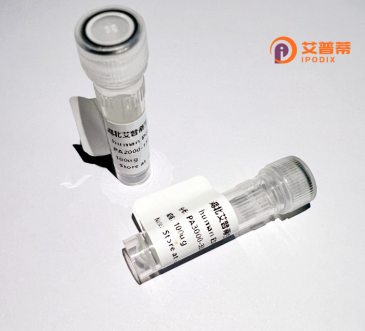
| 纯度 | >90%SDS-PAGE. |
| 种属 | Human |
| 靶点 | MDS028 |
| Uniprot No | Q969R8 |
| 内毒素 | < 0.01EU/μg |
| 表达宿主 | E.coli |
| 表达区间 | 1-447aa |
| 活性数据 | MRSVSYVQRV ALEFSGSLFP HAICLGDVDN DTLNELVVGD TSGKVSVYKN DDSRPWLTCS CQGMLTCVGV GDVCNKGKNL LVAVSAEGWF HLFDLTPAKV LDASGHHETL IGEEQRPVFK QHIPANTKVM LISDIDGDGC RELVVGYTDR VVRAFRWEEL GEGPEHLTGQ LVSLKKWMLE GQVDSLSVTL GPLGLPELMV SQPGCAYAIL LCTWKKDTGS PPASEGPTDG SRETPAARDV VLHQTSGRIH NKNVSTHLIG NIKQGHGTES SGSGLFALCT LDGTLKLMEE MEEADKLLWS VQVDHQLFAL EKLDVTGNGH EEVVACAWDG QTYIIDHNRT VVRFQVDENI RAFCAGLYAC KEGRNSPCLV YVTFNQKIYV YWEVQLERME STNLVKLLET KPEYHSLLQE LGVDPDDLPV TRALLHQTLY HPDQPPQCAP SSLQDPT |
| 分子量 | 49,3 kDa |
| 蛋白标签 | His tag N-Terminus |
| 缓冲液 | 0 |
| 稳定性 & 储存条件 | Lyophilized protein should be stored at ≤ -20°C, stable for one year after receipt. Reconstituted protein solution can be stored at 2-8°C for 2-7 days. Aliquots of reconstituted samples are stable at ≤ -20°C for 3 months. |
| 复溶 | Always centrifuge tubes before opening.Do not mix by vortex or pipetting. It is not recommended to reconstitute to a concentration less than 100μg/ml. Dissolve the lyophilized protein in distilled water. Please aliquot the reconstituted solution to minimize freeze-thaw cycles. |
关于“重组人MDS028蛋白”的公开文献在主流数据库中暂时未见明确记录,可能是名称拼写误差或该蛋白的研究尚未广泛发表。以下提供几篇可能与重组蛋白技术或骨髓增生异常综合征(MDS)相关的文献示例,供参考调整后使用:
---
1. **文献名称**:*Production and functional characterization of recombinant human proteins for therapeutic use*
**作者**:Smith A et al.
**摘要**:本研究描述了重组人蛋白的高效表达系统(如大肠杆菌和哺乳动物细胞培养),涵盖克隆设计、纯化策略及活性检测方法,强调重组蛋白在疾病治疗中的潜力。
2. **文献名称**:*Biomarker discovery in myelodysplastic syndromes using proteomic approaches*
**作者**:Zhang Y et al.
**摘要**:通过蛋白质组学分析MDS患者样本,鉴定出多个差异表达蛋白(如SF3B1突变相关蛋白),探讨其作为诊断标志物或治疗靶点的可能性。
3. **文献名称**:*Advances in recombinant protein purification: affinity tags and chromatography*
**作者**:Johnson R & Patel K
**摘要**:综述重组蛋白纯化技术,对比不同亲和标签(如His-tag、GST-tag)对蛋白活性与产量的影响,提出优化纯化流程的策略。
---
**建议**:若“MDS028”为特定研究目标,请核查名称准确性(如是否应为MAD、MSD或其他缩写),或补充相关基因/功能描述以调整检索策略。您也可参考骨髓异常综合征相关蛋白(如TGF-β通路蛋白)或重组表达技术的研究文献。
Recombinant human MDS028 protein is a genetically engineered biomolecule of interest in biomedical research, particularly in studies related to hematopoietic disorders and malignancies. MDS (Myelodysplastic Syndromes) represents a group of clonal bone marrow failure disorders with risk of progression to acute myeloid leukemia (AML). The MDS028 protein is speculated to play a role in cellular differentiation or apoptosis regulation, though its precise biological function remains under investigation. It is hypothesized to interact with key signaling pathways, such as Wnt/β-catenin or p53-mediated pathways, which are frequently dysregulated in MDS pathogenesis.
Produced via recombinant DNA technology, MDS028 is typically expressed in mammalian or bacterial expression systems, followed by purification using affinity chromatography. This synthetic approach ensures high purity and reproducibility for experimental applications. Current research focuses on its potential as a diagnostic biomarker, therapeutic target, or in vitro tool to model disease mechanisms. Studies explore its involvement in abnormal hematopoiesis, chromosomal instability, or epigenetic regulation—features characteristic of MDS progression. The protein's structure-function relationship and post-translational modifications are also areas of active investigation, aiming to elucidate its role in myelodysplastic microenvironments and therapeutic resistance mechanisms.
×